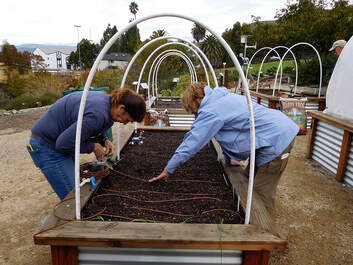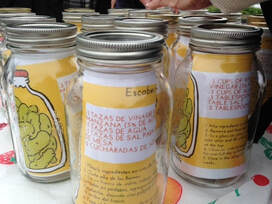
The UC Master Gardener Program extended research-based knowledge and information on home horticulture, pest management and sustainable landscape practices to the residents of San Luis Obispo County.
Last year, the UC Master Gardener Program in SLO County offered residents free monthly “Advice to Grow By” workshops in the Master Gardener demonstration garden, Garden of the Seven Sisters in San Luis Obispo.
These workshops focused on sharing best practices in a fun and informative way on everything from soil and composting, irrigation management and fruit tree pruning to growing cut flowers, berries and natives in the garden.
593 residents participated in these workshops in 2018. Participants were surveyed and the program impacts were evaluated. The results show that residents are learning how to protect natural resources by using less water, less pesticides and by choosing the right plants for their garden.
Last year, the UC Master Gardener Program in SLO County offered residents free monthly “Advice to Grow By” workshops in the Master Gardener demonstration garden, Garden of the Seven Sisters in San Luis Obispo.
These workshops focused on sharing best practices in a fun and informative way on everything from soil and composting, irrigation management and fruit tree pruning to growing cut flowers, berries and natives in the garden.
593 residents participated in these workshops in 2018. Participants were surveyed and the program impacts were evaluated. The results show that residents are learning how to protect natural resources by using less water, less pesticides and by choosing the right plants for their garden.
Water Conservation
- 100% of those surveyed reported choosing low water use plants.
- 80% of participants have installed or have improved drip irrigation systems and have improved their use of mulch.
- 60% have learned how to better use their irrigation timers or have installed new ones.
- 40% have reduced the amount of turf area in their yard and have increased their knowledge and use of captured rain water.
Monitoring for Pests
- 72% of participants have improved their pest monitoring practices, have reduced their overall use of pesticides and are more diligent in following pesticide label requirements.
- 64% have avoided planting or have removed invasive plants from their yards.
Right Plant, Right Place
- 78% reported an improvement in plant selection practices. Selecting the right plant and planting it in the right place reduces the amount of inputs, such as fertilizers, needed for plants to thrive.
Workshop participants also reported additional benefits including an increase in edible gardening, increased donations to the local food bank, and more time spent gardening and outdoors in general.
Workshops scheduled for 2019 will continue the work of teaching sustainable landscape practices to home gardeners. UC Master Gardener volunteers understand that being good stewards of managed and natural landscapes helps to protect natural resources for all SLO County residents.
Workshops scheduled for 2019 will continue the work of teaching sustainable landscape practices to home gardeners. UC Master Gardener volunteers understand that being good stewards of managed and natural landscapes helps to protect natural resources for all SLO County residents.
Helping Residents Extend Food Shelf Life

It was a windy spring day in Los Osos while certified UC Master Food Preserver educators endeavor to set up a demonstration table at the Food Bank distribution site at Baywood Elementary. On this day, they taught local community members how to make and freeze applesauce, extending the bounty of apples received for another day. With recipe cards and food safety information blowing away with the wind, the educators persevered. They soon set up the information and equipment and were ready to help community members extend the life of the produce they take home.
Trained and certified by the UC Cooperative Extension Department of San Luis Obispo County, UC Master Food Preserver educators taught safe and low-cost food preservation methods to almost 900 food-insecure community members at Food Bank distribution sites throughout San Luis Obispo County this past year. Participants learned how to freeze, dry, and safely store their produce. At each demonstration, UC Master Food Preservers provided a recipe and a reinforcement item to help individuals immediately use the information they learned. These items included a box of freezer safe plastic bags for storing applesauce, a juicer and ice cube trays for freezing citrus juice, and a spice kit and canning jar for pickling vegetables.
The most popular demonstration offered by the volunteers at Food Bank sites was refrigerator pickled vegetables. Each person received a quart mason jar with a recipe card and spice packet. UC Master Food Preserver taught participants how to make a brine using simple ingredients, how to clean and prepare vegetables received from the Food Bank, and how to pack the vegetables with the brine and spice packet. The jars were placed in the refrigerator for safe storage (since they are not shelf stable) and allowed to marinate. This kit gave individuals and families the opportunity to implement the information they learned to preserve produce for a future meal. Pickled foods are a part of many different cultures and versatile in their use, so participants were excited to have the skill, knowledge, and opportunity to make their own.
Partnering with the Food Bank has been an effective way to teach simple preservation techniques, which allow food insecure community members to maximize their food resources. Over 98% of participants surveyed indicated that they learned useful information from participating in these lessons. Additionally, these efforts focus on reducing food waste by targeting produce items that may otherwise end-up in the landfill if recipients do not know how to prepare and store them before they spoil. In these ways, the UC Cooperative Extension Department supports healthy people and communities, as well as safeguarding abundant food for all.
Trained and certified by the UC Cooperative Extension Department of San Luis Obispo County, UC Master Food Preserver educators taught safe and low-cost food preservation methods to almost 900 food-insecure community members at Food Bank distribution sites throughout San Luis Obispo County this past year. Participants learned how to freeze, dry, and safely store their produce. At each demonstration, UC Master Food Preservers provided a recipe and a reinforcement item to help individuals immediately use the information they learned. These items included a box of freezer safe plastic bags for storing applesauce, a juicer and ice cube trays for freezing citrus juice, and a spice kit and canning jar for pickling vegetables.
The most popular demonstration offered by the volunteers at Food Bank sites was refrigerator pickled vegetables. Each person received a quart mason jar with a recipe card and spice packet. UC Master Food Preserver taught participants how to make a brine using simple ingredients, how to clean and prepare vegetables received from the Food Bank, and how to pack the vegetables with the brine and spice packet. The jars were placed in the refrigerator for safe storage (since they are not shelf stable) and allowed to marinate. This kit gave individuals and families the opportunity to implement the information they learned to preserve produce for a future meal. Pickled foods are a part of many different cultures and versatile in their use, so participants were excited to have the skill, knowledge, and opportunity to make their own.
Partnering with the Food Bank has been an effective way to teach simple preservation techniques, which allow food insecure community members to maximize their food resources. Over 98% of participants surveyed indicated that they learned useful information from participating in these lessons. Additionally, these efforts focus on reducing food waste by targeting produce items that may otherwise end-up in the landfill if recipients do not know how to prepare and store them before they spoil. In these ways, the UC Cooperative Extension Department supports healthy people and communities, as well as safeguarding abundant food for all.


